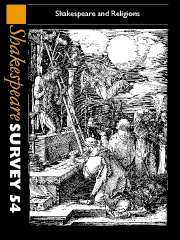Book contents
- Frontmatter
- Shakespeare and the Protestant Mind
- Divine [ ]sences
- ‘An alien people clutching their Gods’?: Shakespeare’s Ancient Religions
- ‘He drew the Liturgy, and framed the rites’: The Changing Role of Religious Disposition in Shakespeare's Reception
- Jonson, Shakespeare, and the Religion of Players
- The Bard and Ireland: Shakespeare’s Protestantism as Politics in Disguise
- ‘Every Good Gift From Above’ Archbishop Trench’s Tercentenary Sermon
- Anthony Munday and The Merchant of Venice
- Perfect Answers: Religious Inquisition, Falstaffian Wit
- When Suicide Becomes an Act of Honour: Julius Caesar and Hamlet in Late Nineteenth-Century Japan
- Religion in Arden
- A Wedding and Four Funerals: Conjunction and Commemoration in Hamlet
- Between Religion and Ideology: Some Russian Hamlets of the Twentieth Century
- Of Shadows and Stones: Revering and Translating ‘the Word’ Shakespeare in Mexico
- Ministers, Magistrates and the Production of ‘Order’ in Measure for Measure
- The Hebrew Who Turned Christian: The First Translator of Shakespeare into the Holy Tongue
- Shakespeare and English Performance Style: The European Context
- All At Sea: Water, Syntax, and Character Dissolution in Shakespeare
- King John, König Johann: War and Peace
- The Tempest’s Forgotten Exile
- The Old Lady, or All is Not True
- Shakespeare Performances in England, 2000
- Professional Shakespeare Productions in the British Isles January-December 1999
- The Year's Contributions to Shakespearian Study 1 Critical Studies
- 2 Shakespeare’s Life, Times, and Stage
- 3 Editions and Textual Studies
- Books Received
- Index
‘Every Good Gift From Above’ Archbishop Trench’s Tercentenary Sermon
Published online by Cambridge University Press: 28 March 2007
- Frontmatter
- Shakespeare and the Protestant Mind
- Divine [ ]sences
- ‘An alien people clutching their Gods’?: Shakespeare’s Ancient Religions
- ‘He drew the Liturgy, and framed the rites’: The Changing Role of Religious Disposition in Shakespeare's Reception
- Jonson, Shakespeare, and the Religion of Players
- The Bard and Ireland: Shakespeare’s Protestantism as Politics in Disguise
- ‘Every Good Gift From Above’ Archbishop Trench’s Tercentenary Sermon
- Anthony Munday and The Merchant of Venice
- Perfect Answers: Religious Inquisition, Falstaffian Wit
- When Suicide Becomes an Act of Honour: Julius Caesar and Hamlet in Late Nineteenth-Century Japan
- Religion in Arden
- A Wedding and Four Funerals: Conjunction and Commemoration in Hamlet
- Between Religion and Ideology: Some Russian Hamlets of the Twentieth Century
- Of Shadows and Stones: Revering and Translating ‘the Word’ Shakespeare in Mexico
- Ministers, Magistrates and the Production of ‘Order’ in Measure for Measure
- The Hebrew Who Turned Christian: The First Translator of Shakespeare into the Holy Tongue
- Shakespeare and English Performance Style: The European Context
- All At Sea: Water, Syntax, and Character Dissolution in Shakespeare
- King John, König Johann: War and Peace
- The Tempest’s Forgotten Exile
- The Old Lady, or All is Not True
- Shakespeare Performances in England, 2000
- Professional Shakespeare Productions in the British Isles January-December 1999
- The Year's Contributions to Shakespearian Study 1 Critical Studies
- 2 Shakespeare’s Life, Times, and Stage
- 3 Editions and Textual Studies
- Books Received
- Index
Summary
Falling, as it inevitably did, on 23 April 1864, the tercentenary of Shakespeare’s birth coincided with a period of exceptionally intense religious controversy. In 1859 Charles Darwin had finally committed The Origin of Species to print; Essays and Reviews (the contentious collection of seven essays on theological and scientific issues, whose contributors included the future Archbishop of Canterbury, Frederick Temple, Mark Pattison and Benjamin Jowett) appeared in 1860; Bishop Colenso’s The Pentateuch and the Book of Joshua Critically Examined, in which the author applied his mathematical skills to the Five Books of Moses with theologically disconcerting results, followed in 1862–3 and in January 1863 Man’s Place in Nature, by T. H. Huxley – the Apostle of Unbelief, who coined the word ‘agnostic’ – was published. The two areas of dispute were firstly the implication of scientific discoveries of evolution for religion and secondly revisionist biblical scholarship, originating in Germany, but with its exponents in Britain. Shakespeare was pertinent to both these issues. Already established as England’s greatest dramatist, his tercentenary gave rise to increasingly expansive claims on his behalf by his fellow-countrymen, thereby framing anew the question of how genius occurred. Could traditional religious doctrine on the subject withstand the challenge of new evolutionary ideas?
- Type
- Chapter
- Information
- Shakespeare Survey , pp. 80 - 88Publisher: Cambridge University PressPrint publication year: 2001
- 2
- Cited by

